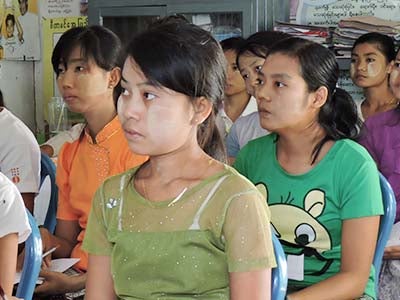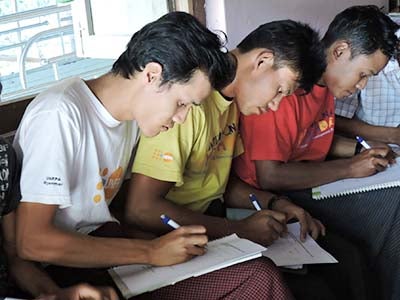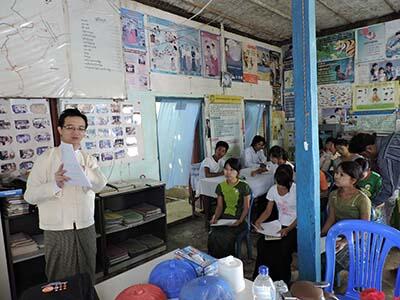UNFPA is planning an in-depth review of its support to rural youth in a number of Youth Information Corners that have been running for a number of years in different parts of Myanmar. To do this and enable this to be youth centered, UNFPA first undertook an exploratory two-day visit to three of such centres in Bago (West) Region to speak with 50 young people and health providers. The centres are located in the villages of Nga Phyu Lay (Tharyarwaddy), Khun Nit (Gyopinkauk) and Ti Tut (Pyay).
Using focus group discussions and a self-administered questionnaire, UNFPA will be analyzing the information that has been obtained to inform its strategy for reaching youth and how to further assess the value and sustainability of the current initiatives in meeting young people’s needs.
For the last 10 years, UNFPA has partnered with the Ministry of Health through the Central Health Educational Bureau (CHEB) and with youth in local communities to increase youth’s knowledge and understanding of reproductive health related topics through space allocated for young people in health centres. Community Support Groups (CSG) were set up and equipped to train youth volunteer peer educators. The training was boosted with the supply of television and games for edutainment, as well as libraries for learning about reproductive health and other topics related to youth.

Since 2004, Youth Information Corners (YIC) have been set up progressively in 70 townships across seven States/Regions. During the visit to Bago (West) Region, the assessment team discussed both the current status of the YICs and their future plans.
Young people were forthcoming with their ideas and wishes to change the situation. Besides telling success stories, they expressed needs such as: counseling for preventing unsafe abortion in early marriage and convincing friends who go to sex workers to use condoms. The youth also highlighted alcohol, drug abuse, early marriage, poverty, family problems, unemployment and new trends in pleasure and sex related activities. Their worry was more on how to cope given that the number of youth peer educators is decreasing. In Nga Phyu Lay, only 14 youth volunteers are left out of 40 trained in 2010. This is because combining school, work and the peer education was proving too much of a struggle. The challenge then is how to bring on board new peer educators, give refresher trainings and relevant equipment, for example bicycles for outreach activities.

Alongside expressing an urgent need for new (and relevant) equipment, the youth suggested the development of audiovisual material for their outreach activities in the field. They wanted interactive materials and approaches that would enable them not only to learn but to test their learning. These, they said, should be cost effective and less time consuming. This might help attract more young people to become peer educators so that more young people can be reached and outreach activities can be shared among more young people. They said this was especially important for reaching young males in rural areas or those who work in family businesses. Equally, training courses should be shorter. Explaining this, one girl said: “If the trainings take too much time our parents do not allow us to join because of a loss of income and workforce”.
These conversations also showed that young people were concerned about gender equality in relation to how reproductive health materials and approaches are developed. Anxious that more would be done for them, young people stressed that communication was the key for a successful transition. Myanmar’s new census data shows that approximately 70% of the population lives in rural areas.


